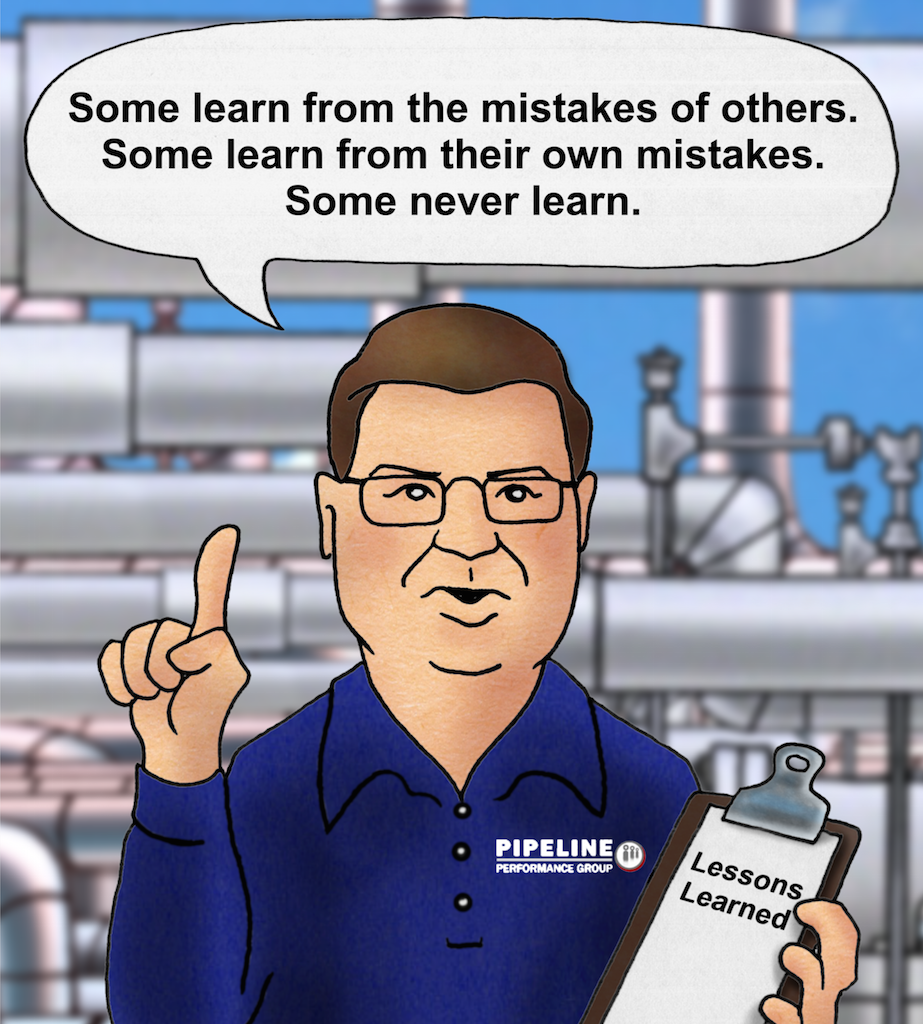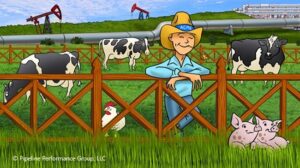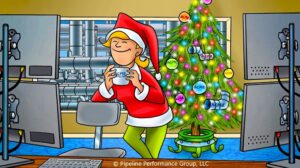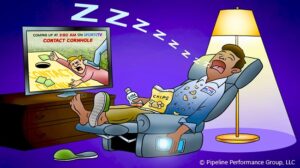Sid Harrell and I organized and led a two-day “Lessons Learned Summit” for a client. What was its purpose? The purpose was to use incident reports and apply the lessons from those incidents in order to prevent future incidents. All pipeline companies ought to be learning from accidents, near misses, abnormal operations, and from other events. Are you learning lessons from your operating experience? Is it easy or difficult to learn lessons from incidents and apply them throughout an organization in order to improve processes, procedures, and practices?
In my experience, it is easy to identify lessons and difficult to apply those lessons. Both organizations and individuals are slow to learn. In the late 1990s, I was responsible for developing a lessons learned program that was based on the process below. Events do occur in operations and maintenance. An event might be a near miss, abnormal operating condition, emergency incident, operating error, spill, leak, accident, or some type of equipment failure.
After an event, some type of analysis of the event should be done. This is often called a “root cause” analysis, using some type of structured method. It is easy to identify causes, but an organization must be rigorous if it really wants to identify root causes. Most organizations are satisfied with finding the human contribution to an event, but are reluctant to find and fix systemic problems. This is often why incidents with similar causes occur again and again. Some never learn.
In addition to identifying causes of an event, corrective actions should be developed. Those corrective actions should be assigned to a person, not a group. Each corrective action should have a realistic due date, and delays in completion should not be tolerated.
Lessons should be developed from these events. Instead of publishing the analysis report with all its gory details, pick out the lessons that are applicable to different audiences in the company. Use this definition of lessons learned from the DOE Lessons Learned Standard: a “good work practice” or innovative approach that is captured and shared to promote
repeat application; or an adverse work practice or experience that is captured and shared to avoid recurrence.
Capture and share the work practices that are useful to particular people in specific jobs. Controllers and/or Operators have different learning needs than Technicians or other maintenance personnel. Once the lesson is developed, distribute it to the correct audience using a variety of media. It is worthwhile to store the lessons and event reports in a database, but most people are too lazy to access the database looking for lessons that are beneficial to their work. The best practice is to have a Lessons Learned Champion to distribute lessons.
Pipeline companies should already have a method for capturing lessons learned and distributing lessons to operations and maintenance personnel. The Control Room Management regulations require that companies have a method for reviewing DOT reportable accidents or incidents that involve Controllers or control rooms. Those reportable events have to be analyzed and lessons learned have to be included in Controller training. The PHMSA inspection guidance indicates that lessons should also be identified from non-DOT reportable accidents or incidents also.
Look at these findings from CRM inspections and ensure that your CRM plan and implementation do not have these deficiencies about “Operating Experience:”
(Notice Of Amendment (NOA) 04/20/15) XXX’s procedures for operating experience as presented had a number of areas where PHMSA noted deficiencies in the procedures reviewed with respect to including lessons learned from the operator ‘s experience in the training program required by this section as identified below:
- The root cause analysis technique used by XXX was not described in the CRM manual.
- The parties responsible for performing the root cause analysis were not identified.
- No provision for determination if Control Room actions or inactions contributed to an event.
- Training in not required to be reviewed for consistency with procedures to ensure no erroneous training is conducted.
(NOA 03/04/15) XXX did not have adequate procedures for incorporating lessons learned for events that did not result in a DOT reportable incident.
(NOA 09/30/13) The XXX Control Room Management Manual, specifically CRM Operating Experience, was inadequate because the procedure lacks details on how control room actions will be evaluated to determine if they contributed to an event, and it does not require a review of recent changes in operations, in accordance with §195.446(g)(1).
(NOA 09/04/13) XXX’s CRM procedures were not in the detail required to assure that lessons learned from XXX’s experience were included in its training program. O&M Manual Section 8.9.4 did not describe examples of events from lessons learned to be included in training; i.e., operating events (in addition to reportable incidents/accidents) like near misses, leaks, operational and maintenance errors, etc.
(NOA 07/13/13) XXX’s written control room management procedures were inadequate because it does not include criteria to review non-reportable events that may be valuable to add lo training as prescribed in §192.631(g)(2).
(NOA 11/29/12)
- The CRM Plan needs to include instructions on how to fill out the incident review form, and formalize training on how to fill out the form.
- The incident review form needs to include incorrect training as a possible contributing factor.
- The fatigue management plan needs to be amended to promote honest reporting of fatigue by the controller as a contributing factor in an incident. The plan should incorporate further review of the white paper documents to determine if any more questions need to be included on the incident review form to aid in the qualitative analysis.
- Section XXX of the CRM Plan needs to include how [lessons learned from] near misses will be factored into the plan.
(NOA 10/10/12) XXX’s procedures for operating experience as presented had a number of areas where PHMSA noted deficiencies in the procedures reviewed with respect to including lessons learned from the operator’s experience in the training program required by this section. Each issue is identified below:
- The root cause analysis technique used by XXX was not included in the CRM manual.
- The parties responsible for performing the root cause analysis were not identified.
- Consider amending the “Near Loss & Loss Investigation Reporting Guide” to state the following: “Determine if Control Room actions or inactions contributed to the event. If so, their deficiencies contributed to:”
- Training is not required to be reviewed for consistency with procedures to ensure no erroneous training is conducted.
- The operating experience section of the CRM manual did not include all operating experience of note being communicated to the controllers (lessons learned, other selected of value, emails noting specific experience considerations) as described verbally during the inspection.
(NOA 09/13/12) XXX’s procedures did not specifically include other operating events in addition to those required by §195.446(g)(l). XXX’s procedures are inadequate, as they do not include other operating events, like near misses, leaks, operational and maintenance errors.
(NOA 07/06/12) The XXX plan did not adequately address including lessons learned from the operator’s experience into the training program. The definition of lessons learned by XXX did not cover all types of lessons gained from operating experience. This should also include those items not associated with reportable events or releases such as field events that could impact the controller. XXX has several reportable and non-reportable events that could be used to improve their training program and would strengthen the training program when one controller’s operating experience is shared with another. An example was presented to XXX and discussed during the inspection regarding their incorporation into the training program a specific tank farm release where the position of a valve could not be determined in SCADA. The CRM rule requires the operator to incorporate into their training program operating experiences. XXX did not consider operating experience associated with the identification of inconsistencies between training program elements and specific procedural requirements.
I have a suggestion for your Control Room, your work group, your company, and for you as an individual. Adopt a mindset to always be learning in order to gain lessons from your experiences and improve performance. Share what you know with others in your company and with your colleagues in the industry. This type of thinking is aligned with the intent of API Recommended Practice 1173 Pipeline Safety Management System which includes the importance of incident investigation, follow up and communication of lessons learned, and learning from external events. As the philosopher Heraclitus said, “Those who love wisdom must investigate many things.” Pipeline companies investigate many things; go further and gain wisdom.





